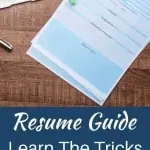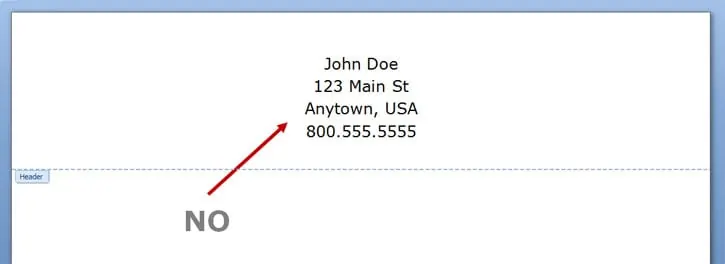THIS POST MAY CONTAIN AFFILIATE LINKS. PLEASE SEE MY DISCLOSURES FOR MORE INFORMATION

It acts as your spokesperson, telling your potential employer of your skills and abilities.
It does not matter how experienced or qualified you are, you will find it difficult to get a job if your resume is not properly written or presented.
In most cases, you will first be required to send your resume to the employer, which will be used to judge your skills and decide if you’re worth calling for an interview.
However, the role of your resume does not stop here.
While it is of huge importance when it comes to getting that first call, it will be with the company throughout and even after the hiring process.
They will use it to design your interview questions or gauge your skills.
This is why it is important that you know how to write a resume so that you can increase your chances of getting the job.
Let’s have a look at tips on how to write a resume with valuable information on the role they play.
Table of Contents
Your Complete Guide For How To Write A Resume
Why Do I Need a Resume?
Consider your resume as a marketing tool that can help highlight your potential.
It shows your potential employer how you fit the available job by highlighting your education, experience, and other skills.
Moreover, it can also show that you’re looking for employment.
In today’s time, you cannot find a job without a good resume as it’s the first tool of communication.
This is why it is important to know how to write a resume for a job.
Resume Tips: 9 Critical Things Your Resume Should Include
While there is no rule etched in stone regarding what to include and what to exclude in a resume, there are some basic rules you must follow.
If you look at some good resume templates, you will notice how they all contain some similar items.
These items can help your resume stand out.
Let’s have a look.
#1. Personal And Contact Details
You should ideally start your resume by clearly mentioning your name, phone number, email, and physical address.
If you’re not comfortable sharing your complete address, you may only mention the city to help your potential employer know where you live.
For example, one time I applied to a job I found on Craigslist.
I was a little nervous about this, so I excluded my full mailing address and only listed my name, phone number and city that I lived in.
Avoid including these details in the header as most recruitment software cannot properly read the information found in headers and footers.
So we suggest that you avoid headers and footers altogether.
What this means is that when you build your resume, do not use the header feature in the document program you are using.
Instead, start your resume off with your contact information at the top of your resume.
Here is a visual to help you understand this clearly.
 #2. Opening Statement
#2. Opening Statement
The most important part of your resume is the opening statement. If you know how to write a cover letter then you will have no trouble in writing the opening statement.
It basically tells the reader who you are but is shorter than a cover letter, typically consisting of six to seven lines only.
It explains your background and experience while highlighting what makes you different, or what you have to offer to the organization.
The opening statement should be written in first person style but without the emphasis on personal reference.
For example, instead of saying “I completed the job”, say “completed the job”.
You can look for tips on how to write a resume objective so that you can create a kick-ass statement.
#3. Skills and Strengths
This section highlights your capabilities and should contain your skills.
You should include about 10-15 skills but make sure they’re all relevant to the post you’re applying for.
Most job ads include a list of skills that the employer is interested in. If you have those skills, make sure to put them first.
You must think of all your experience when creating this list.
It does not only include the office position you’ve had but also your education, sports, and volunteer work.
These should be presented in a list format.
#4. Software And Technical Skills
You may opt to make a separate list for software skills, especially if the job is IT related.
It should also only include relevant skills and must be in a list form. Some examples include:
- Programming languages
- SPSS
- Adobe Photoshop
#5. Personal Skills And Attributes
This section defines who you are as a person and can be very useful if you do not have a lot of skills or experience in the field.
You can present your personal skills in a list format to show why you fit the bill.
This section can include skills such as communication, problem-solving, and learning. The good thing about these skills is that they’re suitable for almost all kinds of jobs.
#6. Educational Background
While education is of huge importance, according to experts it is no more the number one deciding factor when it comes to jobs.
This section should start with your last earned degree and go backward with a list of your relevant academic achievements.
You do not have to mention your grade point average unless it is relevant to the job or you feel it can help you get the job.
However, you should add the name of the degree with the name of the institution.
Completion year should also be added with other achievements such as scholarships and awards won.
If it has been a while since you attended school and you have a lot of experience, you may opt to remove old degrees, especially if they’re not relevant.
#7. Employment History
Start this section with your current or last job and go backward. You should include all relevant experience with the following details:
- Position or title
- Duration and time
- Name of the organization
- Job description and role while highlighting your contributions
You can include all types of experience including internships and volunteer work.
However, if a job is not relevant at all then you may opt to remove it but make sure it does not leave a big hole in your resume as a year of no work may be a cause of concern to the employer.
#8. References And Testimonials
Write down 2-3 references to help your potential employer verify your skills and employment history.
They can refer you for the job and should ideally be your past employers or someone who knows you well but not your blood relative.
You should provide their name, position, and contact details such as phone numbers and emails.
Other than this, you may also add a short testimonial from one of your former employees, teachers, or colleagues verifying your skills and abilities.
Testimonials from trustworthy sources can make a lot of difference.
Just make certain you reach out to anyone you plan to list first. Get their permission and let them know you’re listing them as references so they’re ready in case they receive a call.
#9. Include Keywords
These days most resumes are in digital format.
Recruiters use different software to scan through applications and find the most suitable candidates according to their job titles, skills, education, and other such details.
This software separates resumes into two piles, the good pile and the bad pile.
If your resume does not contain the right keywords then it will automatically get rejected without a person ever looking it over.
Keywords are basically words or phrases recruiters use to find a talent.
These can be a job title (Content Writer, for example), a degree (CA, for example), or a software skill (PowerPoint, for example).
Pay attention to the job description to understand what keywords to include in your resume. However, don’t just add keywords randomly.
They should be in the main body and one keyword being used once is enough.
Resume Tips: 4 Big Mistakes You Need To Avoid
#1. Avoid Typos And Grammar Mistakes
Make sure there are no mistakes in your resume including typos, grammar issues, and factual errors. Even a single mistake can cause you the job.
You can use a tool like Grammarly to find typos and other grammar errors.
However, such tools may not always be fully reliable so make sure to edit your resume manually as well.
If possible, have someone else proofread your resume for typos as it can reduce the risks of mistakes.
A great place to get help reviewing your resume is your career services office at your college. They will be happy to review your resume, edit it and offer feedback, usually at no cost to you.
You may also turn to online resume service providers who can edit it on your behalf. Just know that you will be paying for this service.
In most cases, having a trusted friend or your alma mater review your resume is good enough.
#2. Avoid Lying In Your Resume
Do not lie in your resume regarding anything, from your job history to your education. Most employers run a background check and will find out if you have lied in your resume.
It’s better to not mention something at all than to lie or stretch the truth about it.
#3. Avoid Using Tables In Your Resume
It’s surprisingly common for applicants to use tables in resumes as they make it easier to present information.
However, many recruitment software programs cannot read tables, which is why it may be a good idea to avoid using tables.
#4. Avoid Using PDF Files
PDF is a popular format but many recruitment software cannot read them. Try to submit a .docx or .doc file unless specified otherwise.
How To Write A Resume: Frequently Asked Questions
How Long Should My Resume Be?
There’s no set rules when it comes to length. It largely depends on your education and experience. The more experience you have the larger will be your resume.
However, since recruiters typically spend only four to six seconds on a resume there’s no point in having a large one.
Ideally, stick to a single page and a maximum of three pages if you have a lot of relevant work history or the job is of technical nature.
More pages is never a good idea.
If your resume is longer than three pages, reduce it by eliminating unnecessary information.
Moreover, the length also depends on the professional resume layout you follow so be careful about the template you decide to use.
What Action Verbs Should I Use In My Resume?
Make your resume brighter by highlighting your achievements. Here are some suggested action verbs:
| Advised | Critiqued | Compiled |
| Coached | Designed | Established |
| Examined | Directed | Generated |
| Guided | Illustrated | Improved |
| Hypothesized | Influenced | Invented |
| Negotiated | Ordered | Motivated |
| Oversaw | Recruited | Resolved |
| Prepared | Trained | Upgraded |
How Many Resumes Should I Have?
Tailor your resume according to the job so that it shows why you’re suitable for the job.
The best solution is to create a perfect resume then make some minor tweaks to make it suitable for specific jobs. You will not have to make a lot of changes.
In most cases, you will only have to edit the opening statement, key skills, keywords, and personal attributes.
In addition to this, tailor your resume and highlight how your experience meets the requirements.
For me, I keep a master resume that is always updated. Then when I apply for jobs, I save my master resume as a new resume and edit it to fit the job.
How Do I Optimize My Resume?
Include job title and skills in the resume so that it can be found easily when searched for using software.
Moreover, change the title of the file to ‘Your Name – Position – Skill’. For example: ‘Marie Web Designer WordPress’.
Should I Include Volunteer Work On My Resume?
Yes, if it is relevant to the job. Corporate bosses often take note of job candidates’ volunteer efforts. It shows that you’re motivated about something. Why else would you do it for free?
In fact, about 82% of hiring managers prefer resumes that contain volunteer work. However, your resume should not be full of volunteer work only.
Include it only if it’s relevant or if you have very little real experience.
You may also opt to create a special section for volunteer work if you want to include a few.
How Should I Order My Resume?
While this largely depends on the format, most experts agree that the following is a good order:
#1. Contact details
#2. Opening statement
#3. Key skills
#4. Software or technical skills
#5. Personal attributes
#6. Educational background
#7. Employment history
#8. References
Should I Mention Private Details In The Resume?
You should not mention details that do not impact your position. These include:
- Birthdate
- Gender
- Address (city should be mentioned)
- Disabilities
- Marital status
- Religion
Can I Use Graphics Or Colors To Make My Resume More Attractive?
One of the main resume rules is to stay away from using images, including your own picture.
Most recruiters do not like resumes with images and some software may also not read files that contain photos.
Also, shy away from using colors and fancy format. Use simple formatting and one of the following fonts:
- Verdana
- Century Gothic
- Arial
- Calibri
Avoid using large headers and stick to 11 font size. You may bold headings or use 14 font size to highlight sections.
When Should I Update My Resume?
You should always keep your resume up to date. There are two main reasons for this. First, as times passes, you forget about some of the accomplishments you made.
By keeping your resume updated, you ensure you never forget anything you achieved. And some of these achievements could help you land your next job.
The second reason is that you never know when a potential job might come up.
You may be happy with your current employment, but a friend mentions a new job opening that is your dream job.
By having your resume up to date, you avoid the stress of having to update it and edit in a short amount of time.
- Related: Find out what it means to be passionate about your work
- Related: Learn how to make the most of your career
In other words, always having your resume up to date only helps you, it never hurts you.
Wrapping Up
At the end of the day, your resume is your first introduction to a potential job.
If you mess up, your odds of getting the job drop significantly. Therefore, you should never neglect the importance of your resume.
Take these tips and tricks for how to write a resume and use them to construct the perfect resume.
While doing so won’t guarantee you get the job, it will increase the odds of you getting a call for an interview.
At that time, you can wow your new potential employer with more details about what makes you the perfect hire for the open job.



 #2. Opening Statement
#2. Opening Statement